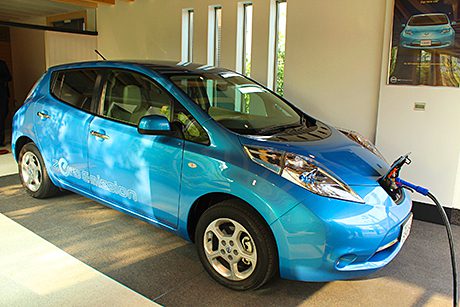
A team of experts from De Montfort University (DMU) in Leicester will be part of major new project to assess the impact of electric vehicle recharging on local electricity networks.
As sales of electric vehicles (EV’s) increase there is a need to assess the potential impact that a cluster of EVs may have in a local area served by one electricity substation. If lots of EVs were recharged at the same time without any preparation, they might overload the local electricity network.
The I2EV project – which has been approved for Low Carbon Networks funding by Ofgem – aims to test what will happen to local networks serving a cluster of EV’s, and to provide a technological solution to avoid the electricity substation being overloaded. It will also deliver a cost-effective solution to local electricity management operators that reduces the need for network reinforcement and allows a faster uptake of EVs.
Leader of the DMU team, Dr Rupert Gammon, said: “As societies become more sustainable, the interactions between the electricity grid and other sectors, like transport, will become critical to the reliable operation of energy systems. This project addresses one of those key interfaces from technical and social perspectives, which is ideal territory for the cross-disciplinary expertise of DMU’s Institute of Energy and Sustainable Developement.”
Nadia Omar, Business Development Manager in DMU’s Faculty of Technology, added: “This is a very exciting project, and one that draws upon a niche part of the overall expertise available at DMU’s Institute of Energy and Sustainable Development. The results of this research could fundamentally change the way we, as consumers, consider our energy usage. A successful outcome will take us one step closer to a low-carbon footprint society.”
The project will be led by EA Technology with partners in the energy, transport and electric vehicle industries – including Nissan.*
Dave Roberts, EA Technology’s Future Networks Director, commented: “The I2EV project will address a real issue that is likely to develop based on forecasts for the increased uptakes of EVs.”
Olivier Paturet, Nissan’s General Manager, Zero Emissions Strategy, added: “Nissan is delighted to be part of a project that takes such a responsible view about the ability of the electricity network to cope with the increased uptake of electric vehicles. The project will play a key role in supporting growth of the EV market.”
The I2EV project is due to run from January 2013 to December 2015.







